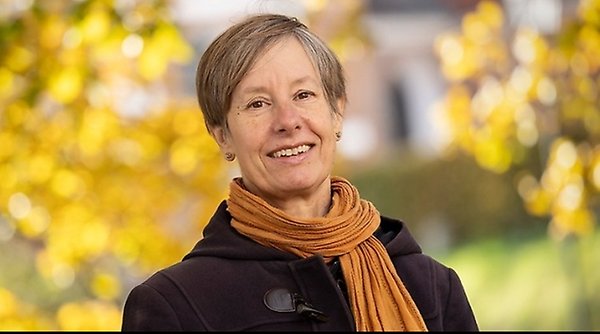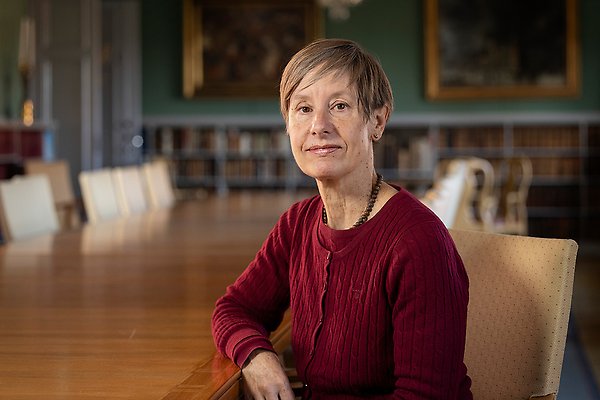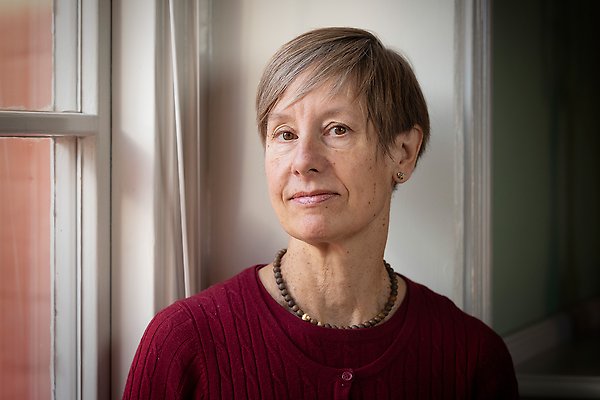Curiosity Inger Österdahl's main driver

The driving force behind Österdahl’s research is simple: curiosity. A desire to know more, to understand and to ask why. Photo: Mikael Wallerstedt
A passionate interest in her subject and in writing is what drove Inger Österdahl, Professor at the Department of Law at Uppsala University, to research international law. An ever-relevant subject, perhaps even more so today as war rages in Europe for the first time in almost a generation.
What is international law? The term often appears in various contexts, not least when talking about war and conflict. International law is the body of law that regulates the rights and obligations of states and other actors. International law includes the UN Charter, the laws of war and human rights, and is the subject in which Inger Österdahl is now a professor at the Department of Law at Uppsala University.
“I’m interested in international politics, international law and all things international, I don’t really know why,” Österdahl responds to the question as to why she chose this particular subject.
Even back during her law studies, it was always international law that proved most interesting to her. This has since remained the case, with the subject only continuing to fascinate Österdahl.
“International law is an important instrument for a functioning world,” she says.
Turned down interview at Ministry for Foreign Affairs
A career in research was not part of the plan when she first chose to study law.
“When I started studying, I hardly even knew that you could do research, but during my studies I made friends who were doing PhDs and I thought it would be fun to do that in international law,” says Österdahl.
She also considered the idea of going on to work as a diplomat, which led her to apply for the programme at the Ministry for Foreign Affairs. She was not accepted, however, and at the same time she was admitted to doctoral studies at the Department of Law.
“I applied again and was invited for an interview, but that time I declined as I wanted to do research instead. I later thought that I could have done both, but back then it felt more black and white.”

Inger Österdahl really enjoy writing, which is how she conduct research in law. She doesn’t do experiments; she has no equipment except her computer and the libraries. Photo: Mikael Wallerstedt
The driving force behind Österdahl’s research is simple: curiosity. A desire to know more, to understand and to ask why.
“I also really enjoy writing, which is how we conduct research in law. We don’t do experiments; we have no equipment except our computer and our libraries. That has probably helped me a lot and also likely serves as a necessary driving force,” she adds.
“Clear violations are being committed in Ukraine"
Almost an entire generation – that's how long Europe was at peace before Russia invaded Ukraine. By starting a war, Russia has violated international law, as the UN Charter of 1945 makes that illegal.
“Then they violated other parts of international law during this armed conflict following the invasion of Ukraine,” explains Österdahl.
There are many rules relating to the conduct of warfare itself, including the Geneva Conventions, which aim to protect civilians and prisoners of war.
“Clear violations of the Convention are being committed, which exists to protect civilians as Russia attacks civilian facilities. I would also imagine, though I don't know the details, that the Convention Relative to the Treatment of Prisoners of War is also being violated,” continues Österdahl.
She also deems it likely that Russia is guilty of crimes against humanity.
“There are many investigations under way in Ukraine and a lot of suspected soldiers. There have been trials with the offender present, but also trials in which the offender has not been there,” she notes.
Difficult to punish those ultimately responsible
International law is partly about bringing individuals to justice; a nation cannot be held criminally liable but can be required to pay damages.
“Authorities have frozen the assets of companies and certain individuals in Russia and are discussing whether they can be used to rebuild Ukraine. But it is not possible to bring the state itself to justice for crimes in the same way as individuals,” explains Österdahl.

“It’s important to punish all those who commit war crimes, but it is perhaps even more important to ultimately punish those who caused the war," says Inger Österdahl. Photo: Mikael Wallerstedt
Although there are numerous ambitious investigations, it is difficult to say how far they will succeed and how many people will be brought to justice.
“There are many international discussions about setting up an international tribunal to prosecute the highest leaders: the president and the foreign minister. “It’s important to punish all those who commit war crimes, but it is perhaps even more important to ultimately punish those who caused the war," she adds.
She does not believe it is impossible to punish those ultimately responsible, but it will not be easy and there are many other aspects that come into play: the outcome of the war, politics and the attitude of the wider international community.”
Current research examining cyber warfare
In general, it is difficult to get a conviction for violations of international law, mainly because there is so much politics involved.
“When it comes to ordinary crimes, it’s more obvious that criminals should be convicted, but after a war, you may not want to get bogged down in details and instead look ahead,” explains Österdahl.
Her own future is also somewhat unclear. She currently has no major research funding and writes about international law on the internet.
“Cyber warfare is quite a big issue and there are discussions under way right now about how to deal with it. I’m trying to understand what they are saying and how these negotiations are going,” she explains.
Curiosity and finding an answer to the question ‘why’ therefore remain Österdahl's main driving force.
“I can maybe contribute something useful to a discussion or debate,” she says.
Agnes Loman
Facts - Inger Österdahl
Title: Professor of International Law at the Department of Law, Uppsala University.
In her free time: Spending time with family and friends.
Last book read: Goodbye to Berlin by Christopher Isherwood
Favourite dish: International law. Joking aside, I like almost all food
Inspiration: Everything that happens in Sweden and across the globe
